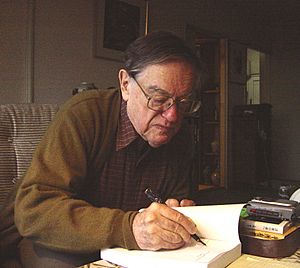Donald Keene facts for kids
Quick facts for kids
Donald Keene
Junior Third Rank
|
|
|---|---|
| キーン ドナルド | |

Keene in his Tokyo home in 2002
|
|
| Born |
Donald Lawrence Keene
June 18, 1922 New York City, New York, U.S.
|
| Died | February 24, 2019 (aged 96) Tokyo, Japan
|
| Nationality |
|
| Education |
|
| Occupation | Scholar, historian, professor, writer and linguist |
| Organization |
|
| Known for |
|
| Awards |
|
Donald Lawrence Keene (born June 18, 1922 – died February 24, 2019) was an American who became a Japanese citizen. He was a very important scholar, historian, teacher, writer, and translator of Japanese literature. A scholar is someone who studies a lot about a subject. A historian studies history, and a linguist studies languages.
Keene was a professor at Columbia University for over 50 years. He was a "Professor emeritus," which means he retired but kept his title because of his great work. After a big earthquake and tsunami hit Japan in 2011, he decided to move there for good. He became a Japanese citizen and took the name Donald Keene in the Japanese style.
Contents
Early Life and Learning
Donald Keene was born in 1922 in Brooklyn, New York City. He went to James Madison High School. He then studied at Columbia University, where he earned his first degree in 1942. He had many famous teachers there.
Later, he learned the Japanese language at a special school for the U.S. Navy. During World War II, he worked as an intelligence officer in the Pacific. This meant he used his language skills to help the military.
After the war, he went back to Columbia University and earned a master's degree. He also studied at Harvard University and Cambridge University in England. He even spent time studying at Kyoto University in Japan. He earned his PhD from Columbia in 1949.
Keene's journey into Japanese studies began early. In 1941, while at Columbia, a man named Jack Kerr invited him to learn Japanese. Their tutor was Inomata Tadashi. This early start helped him become an expert in Japanese culture. He was also inspired by Arthur Waley, a famous translator of Chinese and Japanese literature.
His Work and Achievements
Donald Keene was a "Japanologist." This means he was an expert on everything about Japan. He wrote about 25 books in English about Japanese topics. These included studies of Japanese literature and culture. He also translated many Japanese classic and modern books into English.
One of his most famous works is a four-volume series called "A History of Japanese Literature." This series is now a standard book that many people use to learn about Japanese literature. He also wrote about 30 books in Japanese.
In 2008, the Japanese government gave him the Order of Culture. This is one of the highest honors in Japan, given by the Imperial Family. Donald Keene was the first non-Japanese person to receive this award.
After the 2011 earthquake and tsunami, Keene decided to move to Japan permanently. He wanted to live the rest of his life there. To do this, he became a Japanese citizen. This meant he had to give up his American citizenship because Japan does not allow people to have citizenship in two countries at the same time.
Donald Keene was very well-known and respected in Japan. His decision to move there after the earthquake was seen as a wonderful gesture. It showed his deep love and connection to the country.
Personal Life
In 2013, Donald Keene adopted Seiki Uehara as his son. Seiki Uehara is a musician who plays the shamisen, a traditional Japanese instrument. Donald Keene was never married.
He passed away in Tokyo on February 24, 2019, at the age of 96. He died from a heart attack.
Important Books
Donald Keene wrote many important books and translated many Japanese works. Here are some of his most famous contributions:
- His four-volume series, "History of Japanese Literature," covers Japanese writing from ancient times to the modern era.
- "Emperor of Japan: Meiji and His World, 1852–1912" is a detailed book about Emperor Meiji.
- He translated famous Japanese works like No Longer Human and The Setting Sun by Osamu Dazai.
- He also translated The Narrow Road to Oku by Matsuo Basho, a famous Japanese poet.
Awards and Honors
Donald Keene received many awards and honors throughout his life. These awards recognized his amazing work in Japanese studies.
- He received the Kikuchi Kan Prize in 1962.
- In 1985, he won the Yomiuri Prize, becoming the first non-Japanese person to get this award for a book of literary criticism.
- He was given the Fukuoka Prize in 1991.
- In 1993, he received the Order of the Rising Sun, Gold and Silver Star, Second Class, from Japan.
- He also received the Asahi Prize in 1997.
- As mentioned before, the highest honor, the Order of Culture, was given to him in 2008.
- In 2002, the Japanese government named him a "Person of Cultural Merit." He was only the third non-Japanese person to receive this special title.
 | William Lucy |
 | Charles Hayes |
 | Cleveland Robinson |

